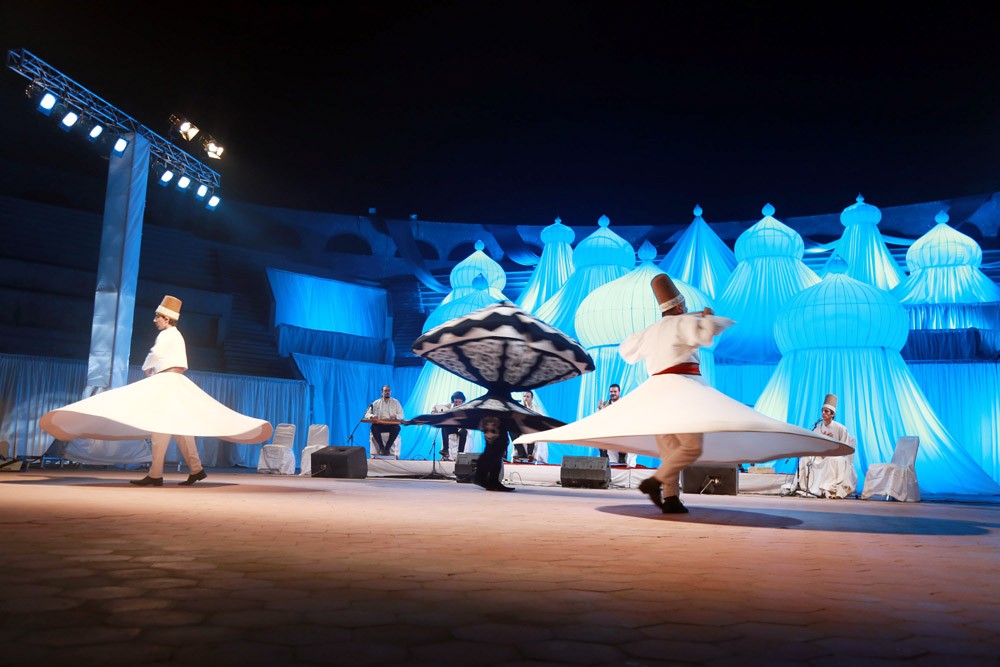
Return of the 13th Mystic Music Festival at the Alhamra Cultural Complex

It was ironic that the Governor Punjab was the chief guest at the 13th Mystic Music Festival organised by the Rafi Peer Theatre Workshop at the Alhamra Cultural Complex and till four o’clock in the evening the organisers did not know whether the festival was to go ahead because they had not been issued a no objection certificate by the relevant authorities. Actually the latter had refused to issue one, citing possible threat to the lives and properties of those involved. It is understandable that the prevalent situation is so uncertain that the authorities prefer to work on the dictum that less activity means less chances of something happening adversely. And so correspondingly choose to opt for banning most activities.
To top it all, the governor in his inaugural address cited the example of the festival held in Fez, Morocco which he may have attended hopping across from the United Kingdom and wanted the organisers to hold a similar festival in Lahore on the same if not a bigger scale. And standing by him were his hosts who were at the end of their tether running from pillar to post and pulling the relevant strings to get a mere no objection certificate from the Punjab Government only a couple of hours earlier.
With such hitches and hurdles, one does not see the possibility of holding international events with any dignity and peace of mind.
These rules and procedures have to be reviewed if the country has to move forward in any meaningful way. The entire energies of the organisers, instead of being spent on the artistic and organisational side of the festivals, are exhausted in making fruitless trips to the district administration and police offices. In the Youth Festival held last month, the same routine had to be followed and the end result was again pulling of strings and knowing the right people.
According to the Peerzadas, it was only during the tenure of Javed Qureshi as the chief secretary that they had an easier passage; otherwise in the twenty four years of their history of festivals, the same story has been repeated. Getting weary of this lack of cooperation, they had shifted the festival to their own premises on Raiwind Road but that place is too far away from the common man. It is good that after the 2008 bomb blast, they have come back to the venue that had become synonymous with the holding of international festivals.
Rafi Peer Theatre Workshop has organised international festivals of performing arts like no other body, whether in the government or private sector. The international artistes have started to trickle back. This festival had two groups one from Syria and the other from Iran. Tahleelah, the whirling dervishes from Syria, have been to these festivals before and they demonstrate a staid and sober representation of the ritual that is associated with Rumi. It is generally assumed that the dervishes are affiliated with the shrine of Rumi in Konya but it seems that there are more than one variant and, in many other places in the Middle East, these dervishes have their own individual groups with differences in style and performance.
Alireza Ghorbani from Iran was very impressive. He had a strong, well-trained voice and sang the kalam of the various poets with full-throated ease. From the information circulated about him, he is quite a celebrated vocalist and is part of the National Orchestra of Iran.
The Pakistani artistes who participated in the festival were Zarsanga, Akhter Chinar Zehri, Shah Jo Raag Fakirs, Akbar Khan Khameeso, Babar and Javed Niazi, Asif Ali Sunto, Wahab Shah, Wahdat Rameez, Goonga and Mithu Sain, Ayaz Hussain, Krishen Lal Bheel, Mehboob Mian Miri Qawals, Shahzad Santoo Qawwals, Pappu Sain Dholiya, Ishfaq Ali, Jaza Hussain Qawwals, Sain Zahoor, Rizwan Muazzam Qawwals, Rafaqat Ali Khan, Badar Ali Khan Qawals, Areeb Azhar, Salman Ahmed Ali Khan, Farazeh Syed, Ejaz Sher Ali, Rakae Rehman, Shaukat Dholiya and House Band led by Akmal Qadri the bansuri player and Bazme Liqa, a group of women singers from Gilgit Baltistan. The accompanist who took part was Zohaib Hasan on the sarangi and Waris Ali Ballu on the tabla.
Despite all the lip service about the ummah, it is sad that we know next to nothing about the contemporary Muslim societies all around the world. The cultural side draws a blank and our understanding of these societies is through their classical expressions in literature and probably music. What has been happening to these societies in recent times, the formal experiments in music, literature film, drama and painting is unknown and unregistered.
Our television channels also do not televise programmes of these countries. Language could be a big barrier as Persian and Arabic are not known and easily understood but then it could also be that it is more deliberate than that. For sure there is more to these societies than just religion and petro dollars -- the two concerns that overwhelm and consume us all the time.
There has to be more interaction between these societies on a broader level and only then will a better understanding emerge of the nature of the relationship. If a festival like that in Fez is held here, it will only be more than welcome.